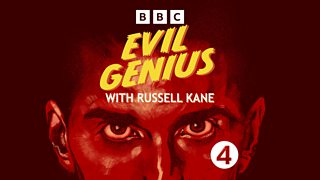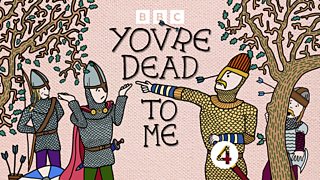Christopher Columbus: World-changing inspirational genius or evil genocidal monster?
He changed the course of history forever. But was Christopher Columbus an incredible, intrepid, maverick voyager or a self-obsessed, tyrannical mass-murderer?
Each week on Evil Genius with Russell Kane, a troupe of comedic minds evaluates the life and status of a notable figure from the past and decides if they are worthy of a statue or worthy of contempt.
This time, Sara Barron, Helen Bauer and Darren Harriott join Russell to look at the life of the era-defining Italian adventurer and pinpoint whether his voyages of discovery were positive or positively barbaric.
Here’s what they discover en route…
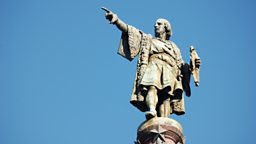
For: He was a great explorer
Columbus was a gifted explorer and a very knowledgeable man. He started sailing at 14 and by the time he was ready for his first major expedition in his forties, he could navigate using the stars and was convinced he could reach India and China not by using the Silk Road overland route but by sailing west or “getting in by the back door”, as Russell puts it. He crossed the Atlantic eight times during the course of his exploring career and travelled tens of thousands of nautical miles.
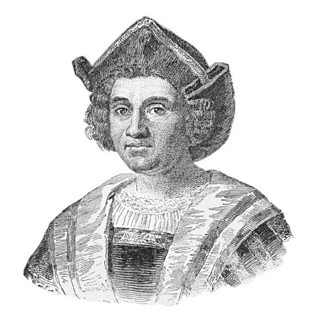
Against: He was exceptionally cruel
Even for the time (the 15th century was a particularly brutal era), Columbus displayed a cruel streak. On the island of Hispaniola (now Haiti and the Dominican Republic), the local indigenous people were kind and generous to the new arrivals. Columbus recognised their openness as weakness and suggested subjugating the locals, controlling and exploiting them horribly. Originally planning to bring Christianity to the new lands, he realised you can’t enslave Christians, and so religion took a back seat. His behaviour became so barbaric that the Spanish authorities actually intervened and Columbus was eventually arrested. As Sara points out: “The real religious zealots are the ones that end up doing the grossest stuff.”
For: He was driven by self-belief
Columbus had a fierce belief in his abilities and refused to be swayed by anyone else. As he attempted to gain funding for his expeditions, he visited many of Europe’s monarchs only to be turned down, “like a 15th-century episode of Dragons Den”, as Russell puts it. Undeterred, he eventually received funds from the Spanish royal family, setting off with 87 men and three old ships. His unwavering confidence in himself and his plans finally paid off. As Darren argues: “I bet he was a great motivational speaker.”
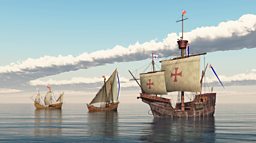
Against: He refused to accept mistakes
Despite the fact that 60 US cities and counties are named after him, Columbus never made it to North America. Seeking a trade route to Southeast Asia, he actually came across the Caribbean plus Central and South America. But he refused to accept that he hadn’t achieved his goal. He convinced himself that the Bahamas were India and Cuba was China, even when he failed to see any famous Chinese cities. When members of the crew disagreed, he forced them to sign a document stating that they had, in fact, reached the Far East. And Russell sums it up: “How is that for gaslighting?”
Can you imagine killing so many people you trigger an ice age?Russell Kane
For: He changed history forever
Columbus’s exceptional navigational and exploring skills encountered previously unseen lands and introduced foods, plants and animals (such as turkeys, tobacco, corn and pineapples) to Europe, while bringing European agriculture (such as sheep and cows) to the Americas. After his first expedition, he returned to Spain, as Russell explains, “like a proper G. Gold, parrots, spices…” His achievements are recognised by cities, towns and even the entire nation of Colombia being named after him. Darren says what we’re all thinking: “It’s crazy how much impact this one guy had.”
Against: He changed history forever
Columbus’s arrival in the Americas introduced diseases such as measles, smallpox, influenza and many more. Research suggests that in the first 100 years after Columbus landed, 90% of the indigenous population had been wiped out by illness. So much land was abandoned, and carbon-sucking plants took over, it caused the Earth’s temperature to drop, triggering the "little ice age". As Russell ponders: “Can you imagine killing so many people you trigger an ice age?” So many indigenous people were killed that it caused a labour shortage that kick-started the transatlantic slave trade, the repercussions of which are still being felt globally.
What did the panel decide? Was Columbus a pioneer or an unforgiveable murderer of enormous proportions? You’ll have to listen to Evil Genius to find out.
This article was amended on 13th April 2023 to correct an error regarding the island of Hispaniola.
More from Βι¶ΉΤΌΕΔ Radio 4
-
![]()
Evil Genius: Cecil Rhodes
Johnny Cochrane, Thanyia Moore and Olga Koch knock down the man behind the statues debate.
-
![]()
Evil Genius: Charles Darwin
Jayde Adams, Angela Barnes and Neil Delamere on the man who came up with evolution.
-
![]()
You're Dead To Me: The Columbian Exchange
Join Greg and his guests in the 15th century to learn about the Columbian Exchange.
-
![]()
Your Place or Mine with Shaun Keaveny
Shaun Keaveny presents the travel podcast that isn't going anywhere.

